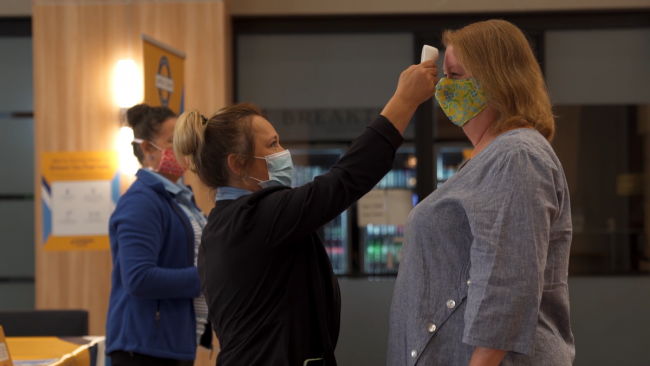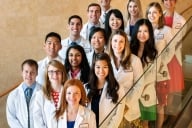You have /5 articles left.
Sign up for a free account or log in.

An Ochsner Health employee takes a woman's temperature as she enters a building.
Courtesy of Ochsner Health
Many college reopening plans hinge on colleges' ability to effectively implement COVID-19 spread-prevention guidelines from the Centers for Disease Control and Prevention and local authorities. Without widespread testing, bringing in students from different locations to live together in close proximity could be much riskier.
The resources to do so are more accessible for institutions with affiliated health systems, but it’s likely more than campus health centers at small colleges can handle.
In preparation for reopening, a number of small liberal arts colleges are inking deals with nearby hospitals and clinics to provide on-campus testing, telehealth, temperature checks and other services to students and employees.
Franklin & Marshall College, a private, nonprofit college serving about 2,300 students in Lancaster, Pa., is scaling up its existing relationship with Penn Medicine Lancaster General Health. The nearby hospital has managed Franklin & Marshall’s student wellness center since 2014, and wellness center and counseling workers are LGH employees, said Margaret Hazlett, vice president and dean of student affairs at the college.
“We will be utilizing a partnership, as LGH is developing for the county contact tracing mechanisms and testing availability,” Hazlett said. “LGH Penn Medicine already has two testing sites up and running here in Lancaster City.”
LGH will also provide health education for students, faculty and staff and keep the college appraised of new information about the virus.
The increase in services comes at no additional cost to the college. Hazlett described the partnership as “just greater intensity of the relationship” that exists between the college and hospital already.
“This is an outstanding benefit that’s unique for a small liberal arts college," she said.
Franklin & Marshall has not officially announced whether students will be back on campus in September. It plans to notify students by July 1.
In Louisiana, Loyola University New Orleans recently announced a partnership with Ochsner Health. The health center has been helping the university create a plan for the fall, said Tania Tetlow, Loyola’s president.
“They sent a team to actually walk the campus and look at everything from our residence halls to our campus spaces and do planning around what social distance looks like on campus,” Tetlow said. “That, and everything from where and whether we should have temperature checks to employee policies about staggering goings and comings -- all of the enormous complexity it takes to run a university during a pandemic.”
Like LGH at Franklin & Marshall, Ochsner has already provided Loyola’s health clinic with nurse practitioners. The group has set up a telemedicine room on campus where students can take their own temperatures and measure other symptoms while speaking with a doctor remotely. It is also helping the university develop and implement a contact-tracing system and testing on campus.
Ochsner is working with a handful of other colleges and K-12 schools in the area but did not disclose which ones.
"Ochsner Health has been on the front lines of the pandemic response, caring for many of Louisiana’s COVID-19 patients, and we feel it’s our responsibility to help our communities stay healthy and safe. That includes equipping organizations of all types, including schools and universities, with the tools and resources they need to reopen safely while easing anxiety and concern," Mark Muller, senior vice president of strategy and business development at Ochsner Health, said in an email. "During the height of the pandemic, my team and I had many conversations with business leaders, including Loyola University president Tania Tetlow, and the need to assist in revitalizing the local economy was evident."
Tetlow would not give specifics on the cost of the new deal, but she said that Ochsner had been “very reasonable.”
“They have been very kind to us about making this affordable,” she said.
The cost of testing is still up in the air. Many colleges have emphasized that routine, large-scale testing will be a cornerstone of their plans to keep students and employees safe, but it’s still uncertain whether such testing will be accessible -- or affordable.
Tetlow is waiting to see how much state public health systems prioritize free testing for university students in the fall and whether or not student insurance plans will cover asymptomatic testing. Reports of the cost of testing has varied widely, anywhere between $50 and $150 per test, NPR reported.
Rhodes College in Memphis, Tenn., is also finalizing a partnership with a local health system, which it has not yet publicly named.
The deal will help the college carry out what college president Marjorie Hass calls the big five: testing, tracing, masking, distancing and tracking of symptoms.
“We knew that as a small college, we needed some outside support,” Hass said. “Our vision was we wanted to provide the same level of expertise that students at major universities, research universities with medical schools attached to them, have at their disposal.”
Exact pricing details are still being hammered out, though Hass said she imagines “this will be a seven-figure investment for Rhodes.” The college is also still determining how to pay for the services, though it has created a health and safety fund and some donors have discussed their support.




